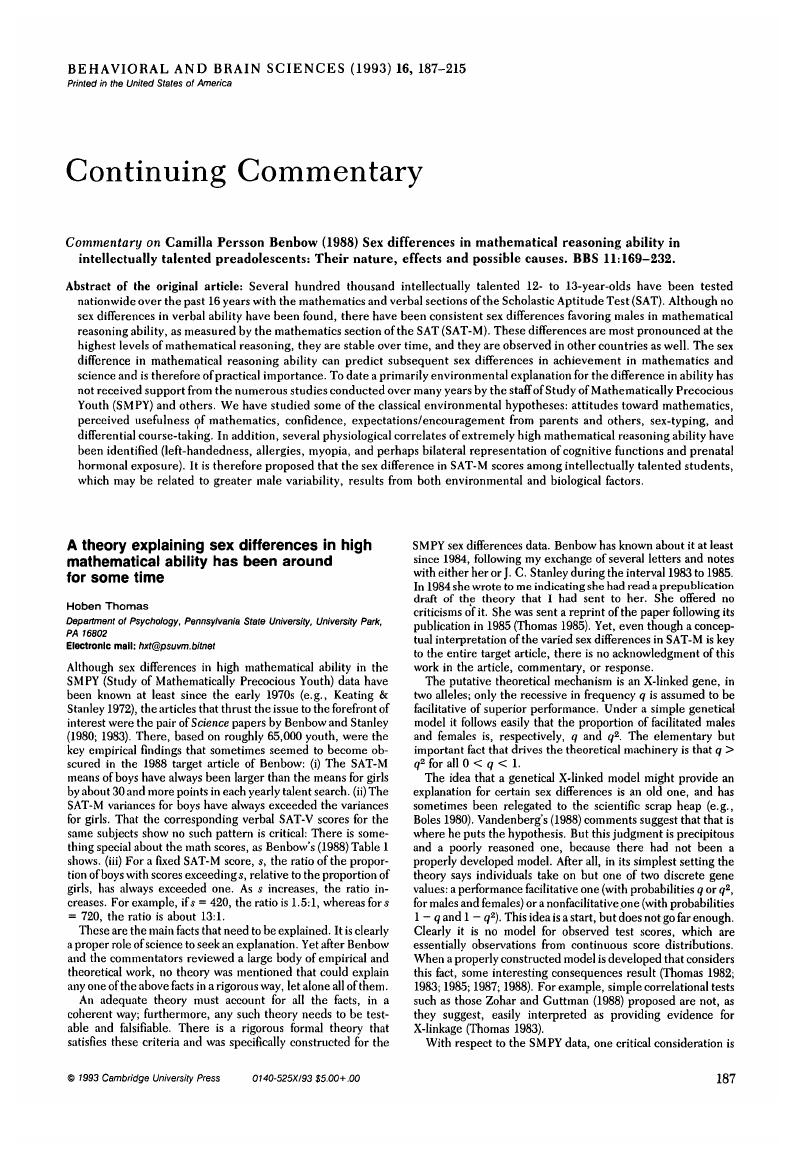Crossref Citations
This article has been cited by the following publications. This list is generated based on data provided by Crossref.
Gillger, Jeffrey W.
1996.
Sex differences in mathematical abllity: Genes, environment, and evolution.
Behavioral and Brain Sciences,
Vol. 19,
Issue. 2,
p.
255.
Crow, T. J.
1996.
All sex differences in cognitive ability may be explained by an X-Y homologous gene determining degrees of cerebral asymmetry.
Behavioral and Brain Sciences,
Vol. 19,
Issue. 2,
p.
249.
Foss, Jeffrey
1996.
Arithmetic and old lace.
Behavioral and Brain Sciences,
Vol. 19,
Issue. 2,
p.
252.
Halpern, Diane F.
1996.
Mating, math achievement, and other multiple relationships.
Behavioral and Brain Sciences,
Vol. 19,
Issue. 2,
p.
256.
Feingold, Alan
1996.
On an evolutionary model of sex differences in mathematics: Do the data support the theory?.
Behavioral and Brain Sciences,
Vol. 19,
Issue. 2,
p.
252.
Dowker, Ann
1996.
How important is spatial ability to mathematics?.
Behavioral and Brain Sciences,
Vol. 19,
Issue. 2,
p.
251.
Humphreys, Lloyd G.
1996.
A critic with a different perspective.
Behavioral and Brain Sciences,
Vol. 19,
Issue. 2,
p.
257.
Wynn, Thomas
Tierson, Forrest
and
Palmer, Craig
1996.
Sex differences and evolutionary by-products.
Behavioral and Brain Sciences,
Vol. 19,
Issue. 2,
p.
265.
Geary, David C.
1996.
On the biology and politics of cognitive sex differences.
Behavioral and Brain Sciences,
Vol. 19,
Issue. 2,
p.
267.
Chipman, Susan F.
1996.
Still far too sexy a topic.
Behavioral and Brain Sciences,
Vol. 19,
Issue. 2,
p.
248.
Epstein, Herman T.
1996.
Omissions relevant to gender-linked mathematical abilities.
Behavioral and Brain Sciences,
Vol. 19,
Issue. 2,
p.
251.
Kornbrot, Diana Eugenie
1996.
Resources dimorphism sexual selection and mathematics achievement.
Behavioral and Brain Sciences,
Vol. 19,
Issue. 2,
p.
259.
Ghiselin, Michael T.
1996.
Differences in male and female cognitive abilities: Sexual selection or division of labor?.
Behavioral and Brain Sciences,
Vol. 19,
Issue. 2,
p.
254.
Geary, David C.
1996.
Sexual selection and sex differences in mathematical abilities.
Behavioral and Brain Sciences,
Vol. 19,
Issue. 2,
p.
229.
Kimball, Meredith M.
1996.
Some problematic links between hunting and geometry.
Behavioral and Brain Sciences,
Vol. 19,
Issue. 2,
p.
258.
Stanley, Julian C.
and
Stumpf, Heinrich
1996.
Able youths and achievement tests.
Behavioral and Brain Sciences,
Vol. 19,
Issue. 2,
p.
263.
Tan, Üner
1996.
We are far from understanding sex-related differences in spatial-mathematical abilities despite the theory of sexual selection.
Behavioral and Brain Sciences,
Vol. 19,
Issue. 2,
p.
264.
Thomas, Hoben
1996.
Between-sex differences are often averaging artifacts.
Behavioral and Brain Sciences,
Vol. 19,
Issue. 2,
p.
265.
Frith, Uta
and
Happé, Francesca
1996.
Mary has more: Sex differences, autism, coherence, and theory of mind.
Behavioral and Brain Sciences,
Vol. 19,
Issue. 2,
p.
253.
Rowe, David C.
1996.
The twain shall meet: Uniting the analysis of sex differences and within-sex variation.
Behavioral and Brain Sciences,
Vol. 19,
Issue. 2,
p.
262.



